|
|
|
Sort Order |
|
|
|
Items / Page
|
|
|
|
|
|
|
| Srl | Item |
| 1 |
ID:
169767


|
|
|
|
|
| Publication |
New York, Oxford University Press, 2018.
|
| Description |
xix, 260p.: figures, tablespbk
|
| Standard Number |
9780190697525
|
|
|
|
|
|
|
|
|
|
|
|
Copies: C:1/I:0,R:0,Q:0
Circulation
| Accession# | Call# | Current Location | Status | Policy | Location |
| 059790 | 337/ROB 059790 | Main | On Shelf | General | |
|
|
|
|
| 2 |
ID:
174654


|
|
|
|
|
| Summary/Abstract |
Powerful states often use tools of economic statecraft, such as foreign aid and other financial policy instruments, in a bid to “purchase” influence as well as establish regional leadership among their neighbors. How and why do these states undertake similar economic statecraft strategies and policies? The article examines the evolution of infrastructure financing policy of China and Japan and identifies the ever changing and, yet at the same time, mirroring interaction between the two countries’ development finance practices. We argue that emulation and competition have led to the process of policy diffusion between these two countries. The competition between these two foreign aid leaders in East Asia especially after China’s Belt and Road Initiative has shaped the region’s infrastructure development dynamics as they strive to move the equilibrium outcome to their advantage. Such equilibrium through the policy diffusion process has important implications on global development governance.
|
|
|
|
|
|
|
|
|
|
|
|
|
|
|
|
| 3 |
ID:
093860
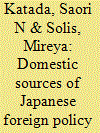

|
|
|
|
|
| Publication |
2010.
|
| Summary/Abstract |
The conventional view in the field of international political economy - that greater economic interdependence creates an incentive for active foreign policy engagement - is hard to reconcile with Japan's foreign economic policy. To explain this counterintuitive outcome, we develop a new model of domestic demand for policy activism that integrates strands of prospect theory, collective action, and interest aggregation. We argue that both the rationale for mobilization and lobbying capacity are essential elements in understanding the domestic demand for significant foreign policy departures. We apply this conceptual framework to Japanese foreign economic policy in two issue areas: finance (Japan's response to the 1980s Latin American debt crisis and the late 1990s Asian Financial Crisis), and trade (Japan's Free Trade Agreement negotiations with Mexico and South Korea).
|
|
|
|
|
|
|
|
|
|
|
|
|
|
|
|
| 4 |
ID:
084012


|
|
|
|
|
| Publication |
2008.
|
| Summary/Abstract |
When a female minority professor struggles to establish authority in the classroom, the first question that comes to her mind is, "Is it me?" By surveying more than a dozen female minority professors, we reach the conclusion that those professors face a unique position and particularly demanding tasks in universities as they face challenges of systemic institutional and social underpinning of universities.
|
|
|
|
|
|
|
|
|
|
|
|
|
|
|
|
| 5 |
ID:
155095
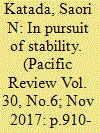

|
|
|
|
|
| Summary/Abstract |
Over the last 30 years, East Asia has progressed from virtually no intergovernmental arrangement in the 1980s to exclusive financial regionalism supported by strong centripetal forces in the aftermath of the Asian Financial Crisis (1997–1998), but this move has not yet produced coherent regional financial architecture. This article examines the evolution of Asia's regional financial architecture of the last three decades and discusses factors that have promoted and inhibited Asia's efforts toward financial regionalism. Since the Global Financial Crisis (2008–2009), the centripetal forces that aided the region's defensive regionalism have weakened, and the crisis has moved the region to seek multiple sources of financial stability from global to regional. On the one hand, given its export-promotion strategy, East Asia still relies heavily on the global financial architecture, and the region's US dollar dependence continues. On the other hand, the Global Financial Crisis has triggered China to seek reform in global financial order and some alternative solutions. For the latter, its monetary authority actively engages in internationalization of its currency, Renminbi, and promotion of the Asian Infrastructure Investment Bank. In this environment, coherent financial regionalism for East Asia is yet to emerge, as East Asian governments continue to search for monetary and financial stability.
|
|
|
|
|
|
|
|
|
|
|
|
|
|
|
|
| 6 |
ID:
078847
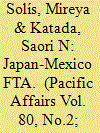

|
|
|
|
|
| Publication |
2007.
|
| Summary/Abstract |
By most accounts, Japan and Mexico remain distant economic partners with only a modest volume of bilateral trade and foreign direct investment, and a large geographical and cultural gulf between them. By this depiction, the Japanese decision to negotiate with Mexico is puzzling if not downright nonsensical: Why would Japan invest so much political capital in the negotiation of a complex free trade agreement (FTA) with a nation accounting for such a minuscule share of its international economic exchange? Solís and Katada challenge this interpretation of Japan's second bilateral FTA ever, and demonstrate that far from being irrational or insignificant, the stakes involved in the Japan-Mexico FTA were very high, and that this cross-regional initiative stands to exert powerful influence over the future evolution of Japan's shift towards economic regionalism. For a number of Japanese industries (automobiles, electronics and government procurement contractors) negotiating with Mexico was essential to level the playing field vis-à-vis their American and European rivals, which already enjoyed preferential access to the Mexican market based on their FTAs. For the Japanese trade bureaucrats, negotiations with Mexico offered an opportunity to tip the domestic balance in favour of an active FTA diplomacy, despite the opposition of the agricultural lobby. Negotiations with Mexico constituted a litmus test, both for the Japanese government and in the eyes of potential FTA partners in Asia, on whether Japan could offer a satisfactory liberalization package to prospective FTA partners to make these negotiations worthwhile
|
|
|
|
|
|
|
|
|
|
|
|
|
|
|
|
| 7 |
ID:
192160
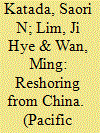

|
|
|
|
|
| Summary/Abstract |
This article examines the Japanese and South Korean governments’ reshoring and diversification policies of supply chains especially away from China since the early 2010s, with particular attention to the measures taken under the 2020–21 pandemic. The article also explores how much Japanese and South Korean reshoring from China, a subset of foreign economic policy, counts as economic statecraft as a deliberate government attempt to achieve geopolitical objectives using ‘economic’ means. One would expect these governments, which innovated proactive industrial policies and guided the private sector to catch up with developed economies in the 20th century, to have an easy time encouraging businesses to re-shore. While these two governments have employed various policy instruments to shift their economic dependence away from China, there is only limited success in motivating businesses to return to their homeland. This leads to an intriguing departure in our understanding of the capacity of those two Asian nations, which used to be considered prototypical ‘developmental states’ where governments have significant influence over business behaviour. This research brings more nuance and complexity to prevailing state-as-unitary-actor assumption of the economic statecraft literature and advocates closer attention to domestic sources of foreign economic policy.
|
|
|
|
|
|
|
|
|
|
|
|
|
|
|
|
| 8 |
ID:
106003
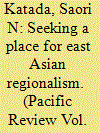

|
|
|
|
|
| Publication |
2011.
|
| Summary/Abstract |
After the devastating experience of the Asian financial crisis more than ten years ago, East Asia launched regional economic cooperation efforts. East Asia's mixed response to the global financial crisis a decade later, however, reveals how certain impetuses that gave rise to unified efforts to regional institution building in East Asia at the time of the AFC derived, fundamentally, from the region's defensive desire as it positioned itself within the harsh global economic and political environment of that time. The GFC triggered reorganization of global economic governance by discrediting neoliberal principles, introducing a new global governance structure and allowing reliance of domestic stimuli for economic recovery. Those shifts, in turn, led to the loss of East Asia's basic mandate towards regional cooperation. In other words, the focus of solving the region's economic vulnerability has now moved from regional arrangement to national and global stages. In particular, the East Asian governments now see less of a need to counterweight the predominant neoliberal voice through unified regional voice as the expansion of the forum to discuss global economic governance to G20 and IMF reform to provide East Asia more representation.
|
|
|
|
|
|
|
|
|
|
|
|
|
|
|
|
| 9 |
ID:
079954


|
|
|
|
|
| Publication |
2007.
|
| Summary/Abstract |
The explosive proliferation of trade forums poses fundamental questions about why states forum-shop as they pursue liberalization. We advance a novel argument linking the institutional design of international trade forums directly to domestic politics. If industrialized democratic states have to appease conflicting forces in the domestic political marketplace as economic liberalization proceeds apace, they should prioritize forums that allow them to exert greater control over the pace and scope of liberalization. This prioritization is influenced by a tradeoff between two critical dimensions that combine differently across all international trade forums: the gains dimension, which determines the extent to which states can increase economic welfare based on the forum's rules; and the control dimension, which determines the extent to which they have power to set the forum's rules in line with their political concerns. We use the case of Japan to demonstrate the importance of the gains-control tradeoff.
|
|
|
|
|
|
|
|
|
|
|
|
|
|
|
|
| 10 |
ID:
078845
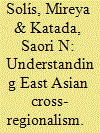

|
|
|
|
|
| Publication |
2007.
|
| Summary/Abstract |
A key feature of East Asian FTA diplomacy remains unacknowledged and, therefore, unaccounted for: the activism displayed in seeking preferential trading relations with countries outside the region. While European and North American countries have also pursued cross-regional trade agreements (CRTAs), East Asia is unique in pursuing extra-regional partnerships before consolidating the regional trade integration process. This framework article identifies the common patterns and fundamental factors behind the East Asian governments' moves towards establishing CRTAs. After laying out the conventional arguments-ranging from the extra-regional market dependence, the region's security arrangements, and economic and political motives behind East Asia's extra-regional interests-the article introduces the novel concept of "leverage." This notion highlights how cross-regional and intra-regional FTA initiatives are intimately linked: East Asian countries frequently choose an extra-regional FTA partner in order to break regional inertias that hinder integration, to win domestic battles, and to appropriate extra-regional negotiation modalities that they can use in their subsequent intra-regional FTA negotiations. The article concludes with a summary of the findings from the country cases, and the policy implications of East Asia's porous regionalism, with its heavy doses of cross-regional trade initiatives.
|
|
|
|
|
|
|
|
|
|
|
|
|
|
|
|
|
|
|
|
|